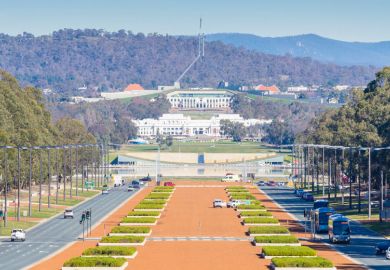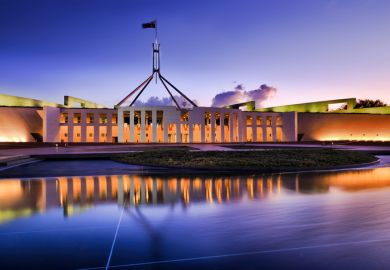Australian university representatives have fallen in behind education minister Dan Tehan’s fee and subsidy reforms, subject to tweaks to his legislation.
Umbrella group Universities Australia (UA) wants changes to inject “certainty and stability” – qualities it says are “in short supply” in the sector. In particular, UA wants additional university places and grant indexation guaranteed through legislation.
Chief executive Catriona Jackson said proposals to reduce funding, by cutting subsidy rates in certain disciplines, were enshrined in legislation “while the initiatives funded by these reductions…are not”. This meant governments would not need parliamentary approval to revoke the aspects of the reforms that appealed to universities.
The Group of Eight (Go8) also wants change that “locks in” as much of the proposals as possible, by including the additional growth funding in legislation, with funding raised sufficiently to accommodate surges in demand caused by both population growth and the pandemic.
The Go8 also says that the changes to fees and subsidies should be rejigged so that no student pays more than the current maximum rate, and the government’s favoured disciplines do not attract less money per student.
The Regional Universities Network also wants funding growth enshrined in legislation “to give certainty to the sector”. But it says that the bill should be passed “as soon as practicable” to leave time for new arrangements to be bedded down before the new academic year.
The demands are articulated in about 80 submissions to the senate’s Education and Employment Legislation Committee, which is conducting an inquiry into the bill. It is due to report by 25 September, about a fortnight before the legislation faces an expected Senate vote, the outcome of which hinges on the decisions of three crucial cross-benchers.
Mr Tehan told the ABC that he had been “having very good discussions with all the cross-benchers” on topics including a legislated funding floor and the possible reclassification of the three universities in South Australia – home state to two of the cross-benchers – to give them more places.
“We’re working through the last of the detail now,” Mr Tehan said. “My hope is that we will see these important reforms pass through the parliament.”
Critics say representative groups have been too eager to accept the package. Australian National University (ANU) policy expert Andrew Norton said that the bill’s problems were “too fundamental to be fixed by amendment”.
Professor Norton stressed that his “personal submission” did not represent the views of the ANU, but said that for two of the reforms’ “key objectives” – assisting regional universities and increasing graduate numbers in fields with strong employment potential – the package “runs a significant risk of producing worse outcomes than current policies”.
ANU vice-chancellor Brian Schmidt recommended jettisoning “unnecessary” auditing measures from the bill, and criticised the logic of using “price signals” to shepherd students into science, technology, engineering and mathematics (STEM) subjects.
“To respond to the emerging threats and opportunities we must examine the big questions from all angles,” the acclaimed physicist said. “Some of the answers will come from STEM, but without…support from the humanities, we will be ill-equipped to meet the challenges that lie ahead.”
Free market thinktank the Institute of Public Affairs backed the near eradication of subsidies for Australia’s humanities courses, saying they overlooked Western civilisation and promoted “a distorted view of the world in which the past is viewed as a contest between the oppressors and the oppressed”.
Register to continue
Why register?
- Registration is free and only takes a moment
- Once registered, you can read 3 articles a month
- Sign up for our newsletter
Subscribe
Or subscribe for unlimited access to:
- Unlimited access to news, views, insights & reviews
- Digital editions
- Digital access to THE’s university and college rankings analysis
Already registered or a current subscriber?








